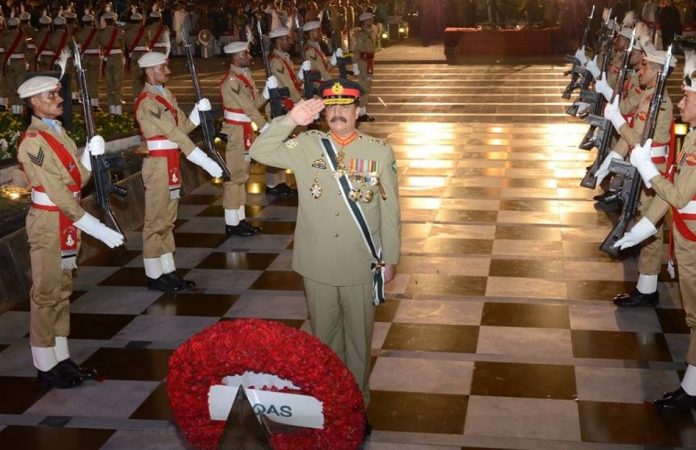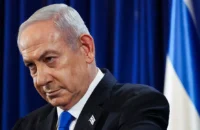Pakistan Army can’t stay out of politics because it thinks it’s the nation’s saviour
by Husain Haqqani
The Pakistani military continues to re-engineer politics by removing undesirable politicians and advancing the careers of civilians considered more pliable.
If insanity is doing the same thing again and again, and expecting a different result then Pakistan’s permanent establishment is definitely insane.
After four military coups, several constitutional changes, and military-sponsored reconfigurations of political parties, the Pakistani military is persisting with its efforts to re-engineer the country’s politics. The objective, as in the past, seems to be to change the country’s political landscape by removing undesirable politicians and advancing the careers of civilians considered more pliable by military generals and intelligence colonels.
The ruling Pakistan Muslim League-Nawaz (PML-N), brought to the fore in the 1980s as the beneficiary of similar engineering under the late dictator General Zia-ul-Haq and his immediate successor, Generals Aslam Beg and Hamid Gul, is now being decapitated. The removal of its leader Nawaz Sharif from the office of the prime minister was the first major step in that direction.
Ironically, a similar effort to contain the PML-N was made by General Pervez Musharraf after his 1999 coup d’etat. Back then, many of the party’s legislators were herded into a rival PML faction, which disintegrated soon after Musharraf lost power. Nawaz Sharif returned from exile to reclaim his party’s leadership, only to be subjected again to a similar cycle of judicially backed disqualification from office.
The Pakistan Peoples Party (PPP), the country’s largest political party for decades, was the target for demolition when the PML-N was being built up. Zia hated the party of Zulfikar Ali Bhutto, the man he toppled from power and executed after a show trial. The party won three elections (1988, 1993, and 2008) despite the establishment’s machinations against it but was never able to govern effectively.
It is now considerably weakened after having lost its leader, Benazir Bhutto, to a terrorist attack in 2007 and being battered by charges of corruption for almost three decades. Ironically, none of these corruption charges, though widely believed in Pakistan, have ever resulted in convictions after trial.
Now, the Sindh-based political party representing the ethnic Muhajirs, the Muttahida Qaumi Movement (MQM), is in the establishment’s crosshairs. The establishment has always resented the party’s control over Pakistan’s major port city, Karachi. It has won every election in the city since 1987 and has periodically been targeted for repression.
Musharraf, himself an ethnic Muhajir attempted to mainstream the MQM by including it in his government. As dictator, he convinced other generals that the MQM would mellow after tasting power and would change its stance away from its demand for a multi-national state and its single-minded opposition to Pakistan’s Islamist ideology.
But when the party’s exiled leader, Altaf Hussain, called Pakistan “the epicenter of terrorism” last year, intelligence operatives set about trying to divide the MQM once again. Altaf Hussain has been in exile since 1992, when the military began operations in Karachi aimed at cleansing the city of his devotees.
Ethnic Muhajirs, immigrants to Pakistan from India and their children, have remained loyal to Altaf Hussain, whom they see as the father of a Muhajir nation. Until Hussain came on the scene, the Muhajirs had no one speaking of protecting their rights while every other ethnic group had its spokespersons.
Altaf Hussain annoyed the authorities particularly by warning them that Muhajirs would choose not to be loyal to the country if the “extra-judicial killings” of MQM activists continued. For decades, the military has accused the MQM of acting like the mafia and being involved in racketeering, abductions, torture and murder.
The party denies these charges and adds them to its long list of complaints about decades of discrimination and injustice at the hands of a Punjabi elite.
In an unprecedented step last year, the Lahore High Court ordered registration of a treason case against Hussain and banned his speeches and images in the Pakistani media.
The military’s political engineers assumed that once Altaf Hussain was out of sight, Karachi’s Muhajirs could be persuaded to abandon him. Hussain, known for his emotional speeches, was accused of saying ‘Pakistan Murdabad’ (Down with Pakistan) in one of his addresses and his explanation of the context of that remark in terms of reaction to oppression and injustice was not accepted.
In March 2016, some of the MQM figures most associated with the criminal activities attributed to the party announced the formation of the Pak Sarzameen Party (PSP) led by former Karachi Mayor, Mustafa Kamal. Later, another former Karachi Mayor and a consummate politician, Dr. Farooq Sattar, broke away from Altaf Hussain to create MQM-Pakistan. The two parties have been in merger talks as neither has been able to mobilise popular support.
Kamal, the PSP leader, said publicly that the Pakistan Army, ISI and Military Intelligence (MI) wanted to close down the MQM for good because “they know Altaf Hussain works for [Indian Intelligence] RAW” and because “he is a traitor.” According to him, “MQM-P was formed in the room of former Director General Sindh Rangers Bilal Akbar” following Altaf Hussain’s speech criticizing Pakistan.
Thus, while the PSP had been spawned by the ISI then led by Lt. General Rizwan Akhtar, the MQM-P had been sponsored by the Rangers commander, Major General Bilal Akbar.
Subsequently, the current Director-General of Sindh Rangers, Major General Mohammed Saeed, admitted to his institution’s role in brokering the merger of the two parties created by two wings of the establishment, only to backtrack after widespread media criticism. After all, it is one thing for generals and colonels to unconstitutionally interfere in the political process, it is quite another to brag about it in public.
But the real question remains: why do Pakistan’s senior military and intelligence officers consider it their right to intervene in politics, publicly or privately, even though it violates their constitutional oath as military officers?
Under article 244 of Pakistan’s Constitution, all military officers must take an oath specified in the third schedule. That oath says that every military officer must “solemnly swear to bear true faith and allegiance to Pakistan and uphold the Constitution of the Islamic Republic of Pakistan which embodies the will of the people.” The oath also says that “I will not engage myself in any political activities whatsoever and that I will honestly and faithfully serve Pakistan in the Pakistan Army (or Navy or Air Force) as required by and under the law.”
Adhering to the Constitution and fulfilling the oath to stay out of politics is difficult for an army trained to think of itself as Pakistan’s saviour. The generals and colonels who meddle in politics convince themselves that they are only protecting Pakistan from ‘treasonous politicians’ by breaking their solemn oath.
The military officers alone are judges of treason, a charge that is frequently made but has never been brought or proved in court against any Pakistani public figure since independence.
That they won’t succeed in their political engineering just as their predecessors failed is beyond the grasp of simple, patriotic soldiers. Until Pakistan’s soldiers understand that the flaws of politics and politicians can only be remedied by better politics and politicians, they will continue to make and break political parties and alliances.
The new parties and alliances will go the way of similar engineered political entities of the past. The list is long and getting longer. Unfortunately, Pakistan’s politics are not getting any better.



























